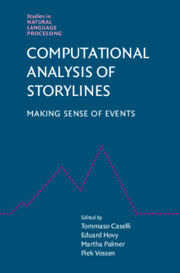Book contents
- Frontmatter
- Contents
- List of Contributors
- Introduction and Overview
- Part One Foundational Components of Storylines
- 1 The Role of Event-Based Representations and Reasoning in Language
- 2 The Rich Event Ontology: Ontological Hub for Event Representations
- 3 Decomposing Events and Storylines
- 4 Extracting and Aligning Timelines
- 5 Event Causality
- 6 A Narratology-Based Framework for Storyline Extraction
- Part Two Connecting the Dots: Resources, Tools, and Representations
- Author Index
3 - Decomposing Events and Storylines
from Part One - Foundational Components of Storylines
Published online by Cambridge University Press: 06 November 2021
- Frontmatter
- Contents
- List of Contributors
- Introduction and Overview
- Part One Foundational Components of Storylines
- 1 The Role of Event-Based Representations and Reasoning in Language
- 2 The Rich Event Ontology: Ontological Hub for Event Representations
- 3 Decomposing Events and Storylines
- 4 Extracting and Aligning Timelines
- 5 Event Causality
- 6 A Narratology-Based Framework for Storyline Extraction
- Part Two Connecting the Dots: Resources, Tools, and Representations
- Author Index
Summary
Stories are typically represented as a set of events and temporal or causal relations among events. In the metro map model of storylines, participants are represented as histories and events as interactions between participant histories. The metro map model calls for a decomposition of events into what each participant does (or what happens to each participant), as well as the interactions among participants. Such a decompositional model of events has been developed in linguistic semantics. Here, we describe this decompositional model of events and how it can be combined with a metro map model of storylines.
Information
- Type
- Chapter
- Information
- Computational Analysis of StorylinesMaking Sense of Events, pp. 67 - 86Publisher: Cambridge University PressPrint publication year: 2021
